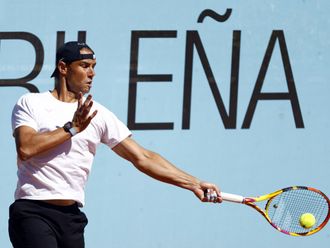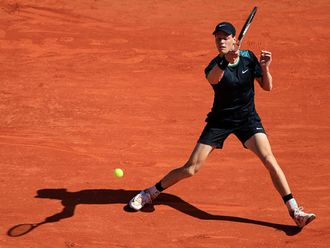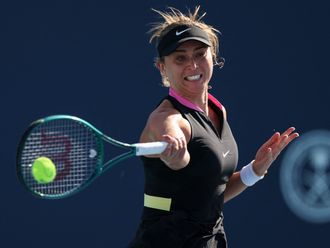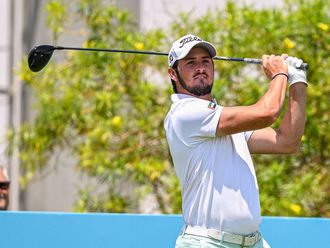Wimbledon: The queue outside Court 18 stretches around the block, waiting patiently for the end of the 11th game.
At Wimbledon, you can take or vacate your seat only at a changeover, and so when it arrives, the line shuffles forward in anticipation. But to everyone’s disappointment, the front of the queue does not budge. Every seat is occupied, and nobody is leaving. The source of the commotion soon becomes clear.
Inside, the familiar sight of Greg Rusedski and Mark Philippoussis pinging 125mph (201km/h) serves at each other. Lleyton Hewitt nailing a backhand down the line, and celebrating with his classic fist pump, the one where you can never quite tell whether he has just won a point or murdered a man in cold blood.
This is the invitational doubles, where no grand-slam titles are at stake and no ranking points will be awarded. The participants may be a little greyer and a little stiffer than they were in their prime, the knees and ankles a little rustier, the abs a little more yielding. But the struggle is real.
As Wimbledon winds to a close, the legends begin to descend on the outside courts, and for those without stadium tickets, the opportunity to spy some of the game’s gilded names in their natural habitat is almost as good as the real thing. In a way, it is one of the sport’s enduringly sweet curios: the equivalent of seeing Brian Lara and Steve Waugh having a hit during the lunch break at Lord’s, or Joe Bugner and George Foreman agreeing to a light dust-up on the undercard of some massive super-fight.
And while nostalgia may be the primary motivation, you would be surprised at how high the standard still is. “The level is actually pretty good,” says France’s Fabrice Santoro, who is playing with Rusedski this year. “It’s just the doubles, so physically it’s fine. It’s such a great pleasure, and actually a lot of fun.” The list of invitees spans ages and eras. Hewitt was still competing at the top level as recently as last year. At the other end of the scale, the likes of Henri Leconte and Martina Navratilova are a generation on from their peak.
Philippoussis, meanwhile, has been retired for more than a decade, and after an epic tie-break win over Rusedski and Santoro, is feeling the effort. “I’m sore,” he says as he retreats to the comfort of the locker room. “I haven’t even done anything, and I’m sore.”
The atmosphere may be largely jovial — “You want to change ends, or what?” Hewitt shouts over the net as the tie-break reaches 6-6. But never forget: these are still sporting beasts at heart. “Nooo!” Philippoussis cries in anguish as a lob eludes him.
“It’s about entertaining the crowd and having fun, playing some good points,” he explains later. “But we’re still athletes. We’re still competitive.” Naturally, the crowd are lapping it up. These are players that were gracing Centre Court and lifting trophies not so long ago.
Now, for the price of a £20 (Dh95) ground pass, fans have a courtside seat. What the players get out of it, by contrast, is harder to discern. The modest £17,000 prize money will barely outlast the aches and pains they will develop in return. Then there is the time outlay: many of the participants have a plethora of corporate, media and family commitments to work around.
But still, they, too, lap it up, and for far more prosaic reasons.
A short walk away on Court 8, Barbara Schett and Magdalena Maleeva are playing Mary Joe Fernandez and Lindsay Davenport in the ladies’ competition. They may have 169 years and eight children between them, but when the opportunity comes to play at Wimbledon, you drop everything.
“It’s such an honour to come back,” says Schett, the former world No 7 and now a television presenter. “Every year when I get an invite, I’m like: ‘Yay! I can come back here!’ I play with my friends who I used to play with. It’s like a flashback.”
Schett had already retired by the time she became a mother. But now, eight-year-old Noah can watch her playing at Wimbledon. And while the pace may be a little more sedate than it was in their heyday, in many respects it is just like old times.
Especially when Davenport suddenly brings her A-game, taking control of the second set with a string of scintillating passes. The match ends. Hugs are dispensed. Davenport and Fernandez are the winners, but, frankly, who cares?
As the quartet chat at the net, wreathed in weary smiles, we could simply be watching four old friends having an afternoon knock-up in the park. Revelling in the simple joy of tennis. “Besides our kids and our families and our husbands, tennis is the big love of our lives,” says Schett.
“It’s given us so much.”
And as she departs with a spring in her step, husband and son in tow, you realise that sometimes, sport is its own reward.
— The Telegraph Group Limited, London 2017











